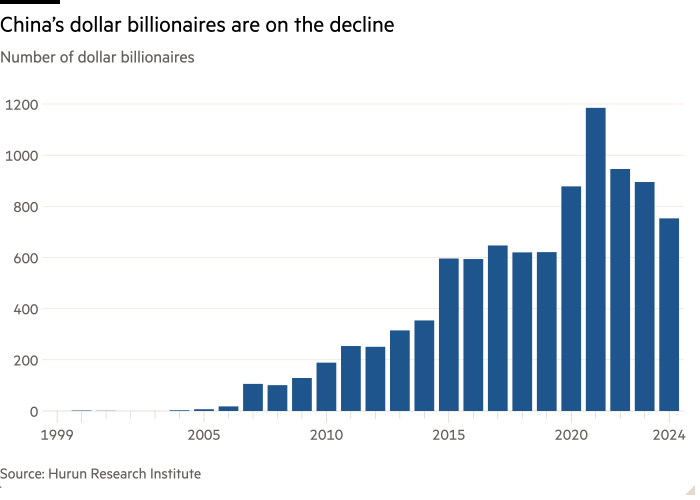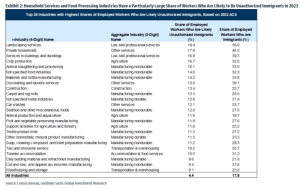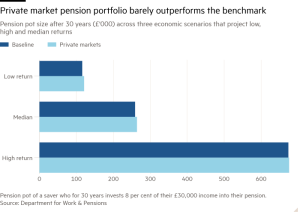China loses third of billionaires as economy declines

Stay informed with free updates
Simply sign up to the Chinese business & finance myFT Digest — delivered directly to your inbox.
The number of China’s dollar billionaires has fallen by more than a third in the past three years, according to a “rich list” compiled by research group Hurun, as government crackdowns, weakness in parts of the economy and depressed equity markets take their toll.
Since hitting a peak of 1,185 in 2021, Hurun said the number of dollar billionaires had been reduced to 753, with the 36 per cent decline exceeding a 10 per cent fall in the renminbi’s value against the dollar over the same period.
In the past year alone, the number of dollar billionaires in China declined by 16 per cent, when the renminbi depreciated only 2.5 per cent against the dollar.
The list has also undergone rapid churn, Hurun said, with older entrepreneurs such as property developers making way for newer members such as Zhang Yiming, head of ByteDance.
The 41-year-old founder of the company that owns viral short-video platform TikTok and its Chinese equivalent Douyin has for the first time become the nation’s richest person, with a fortune of $49bn, Hurun said, despite his company being targeted by the US government.
He deposed “bottled water king” Zhong Shanshan. The 70-year-old had topped the list for the past three years, but his main business Nongfu Spring saw its share price drop 40 per cent after being accused on social media of being “pro-Japan”.
The rich list also included Hong Kong, Macau and Taiwanese entrepreneurs.
The “list has shrunk for an unprecedented third year running, as China’s economy and stock markets had a difficult year”, said Rupert Hoogewerf, chair of the Hurun Report.
The list’s estimates of fortunes were made at the end of August and do not account for a sharp stock rally in September after China announced a monetary stimulus package.

The downturn in the number of super-rich comes as the old guard of wealthy real estate developers has been decimated by a collapse in China’s once-booming property market.
China’s ecommerce billionaires have been badly hit by crackdowns but have proven more resilient. Pony Ma, the founder of Tencent, the company behind the ubiquitous superapp WeChat, ranked third on the list, and Colin Huang, the founder of Pinduoduo and Temu, was fourth.
Chris Xu Yangtian, founder of international clothing platform Shein, was ranked 76th with $7bn in wealth.
“The new generation of entrepreneurs in China are much more international than their predecessors,” Hurun said in the report.
Alibaba’s Jack Ma, who topped the list in 2020 but disappeared from public view that year after the government cancelled the blockbuster initial public offering of his financial group Alipay, was ranked 10th this year.
Hurun said 15 per cent of the rich list lived outside mainland China, in Hong Kong, Macau or Taiwan, while 30 members lived in the US and Singapore, with the Asian city-state becoming increasingly popular as an offshore haven for China’s billionaires.
The richlisters also retained political influence, with about 7 per cent being members of China’s top political advisory body, the Chinese People’s Political Consultative Conference, or its rubber-stamp parliament, the National People’s Congress.
Smartphones and new-energy entrepreneurs were also more prominent on the list than 10 years ago, including Robin Zeng, head of lithium battery maker CATL, Li Zhenguo of solar-panel maker Longi, Lei Jun of smartphone maker Xiaomi and Wang Tao from drone maker DJI.
#China #loses #billionaires #economy #declines





